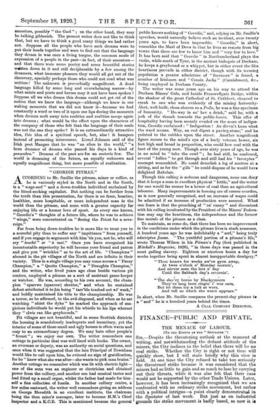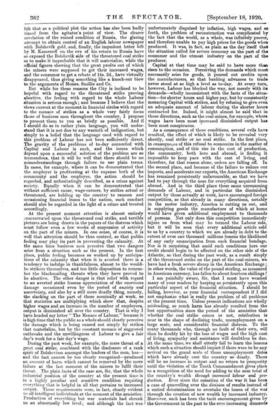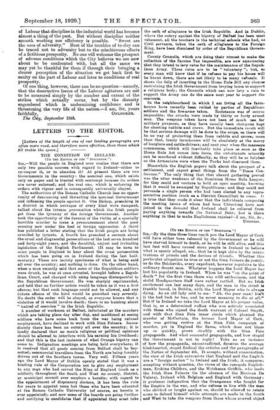FINANCE—PUBLIC AND PRIVATE.
THE MENACE OF LABOUR.
[To rue EDITOR OF TIM EPECTATOR."1 SIR,—Despite the threatening outlook at the moment of writing, and notwithstanding the defiant attitude of the miners, the City inclines to the belief that there will be no coal strike. Whether the City is right or not time will quickly show, but I will state briefly why this view is held. At one time the City refused to take too seriously the threatened strike because it was considered. that the miners had so little to gain and so much to lose by carrying out their threats, while it was also felt that their case would not be supported by the other Trade Unions. Later, however, it has been increasingly recognized that we are confronted with no ordinary strike movement, but rather with a political intrigue—a point clearly demonstrated in the Spectator of last week. But just as on industrial grounds the strike movement is badly based, so now it it felt that as a political plot the action has also been badly timed from the agitator's point of view. The clearer revelation of the ruined condition of Russia, the glaring attempt to obtain control of an English labour newspaper with Bolshevik gold, and, finally, the impudent letter left by M. Kameneff on the eve of his return to Russia have so exposed the Bolshevik side of the threatened coal strike as to make it improbable that it will materialize, while the official figures showing that the great profits out of which the miners were supposed to get their increased wages, and the consumer to get a rebate of 14s. 2d., have virtually disappeared, thus giving something like a knock-out blow to the arguments of Messrs. Smillie and Co. But while for these reasons the City is inclined to be hopeful with regard to the threatened strike proving abortive, the feeling with regard to the whole Labour situation is serious enough ; and because I believe that the views current at the moment in financial circles with regard to the menace of strikes as a whole very fairly focus those of business men throughout the country, I propose to present them to you as briefly as possible. And if I should do so in rather plain language, you will under- stand that it is not due to any warmth of indignation, but simply to a belief that the language used with regard to this problem of Labour has not been sufficiently direct. The gravity of the problems of to-day connected with Capital and Labour is such, and the issues which depend upon a successful solution of the problem are so tremendous, that it will be well that there should be no misunderstandings through failure to use plain terms. In cases, for example, where it can be demonstrated that the employer is profiteering at the expense both of the community and the employee, the action should be regarded, and unhesitatingly described, as a crime against society. Equally when it can be demonstrated that without sufficient cause, wage-earners, by strikes actual or threatened, are holding up the country to ransom and occasioning financial losses to the nation, such conduct should also be regarded in the light of a crime and treated accordingly.
At the present moment attention is almost entirely concentrated upon the threatened coal strike, and terrible pictures are being drawn in the papers of the distress which must follow even a few weeks of suspension of activity on the part of the miners. In one sense, of course, it is well that attention should be thus centred, so that public feeling may play its part in preventing the calamity. At the same time business men perceive that two dangers arise from a situation such as the present. In the first place, public feeling becomes so worked up by anticipa- tions of the calamity that when it is averted there is a tendency to indulge in thankfulness, almost to the would- be strikers themselves, and too little disposition to remem- ber the blackmailing threats when they have proved to be abortive. The other danger is that relief with regard to an averted strike lessens appreciation of the enormous damage occasioned even by the period of anxiety and uncertainty, and also by a still more deadly thing, namely, the slacking on the part of those nominally at work, so that statistics are multiplying which show that, despite higher wages and an increase in the number of employees, output is diminished all over the country. That is why I have headed my letter " The Menace of Labour," because it is high time that the public as a whole should clearly perceive the damage which is being caused not simply by strikes that materialize, but by the constant menace of suggested outbreaks and the unwillingness of Labour to give a fair day's work for a fair day's wage.
During the past week, for example, the mere threat of a great coal strike, combined with the disclosure of a rank spirit of Bolshevism amongst the leaders of the men, has— and the fact cannot be too clearly recognized—produced an amount of harm which cannot be removed by the mere failure at the last moment of the miners to fulfil their threat. The plain facts of the case are, Sir, that the whole industrial position of the country at the present time is in a highly peculiar and sensitive condition requiring everything that is helpful in all that pertains to increased. output. Those requirements were, in fact, clearly evident to all intelligent individuals at the moment of the armistice. Production of everything but war materials had shrunk to an abnormally low level ; and although the fact was unfortunately disguised by inflation, high wages, and so forth, the problem of reconstruction was complicated by the fact that the world, as a whole, was infinitely poorer, and therefore unable to pay high prices for the goods when produced. It was, in fact, as plain as the day itself that the situation called for severe economy on the part of the consumer and the utmost industry on the part of the producer.
Capital at that time may be said to have more than risen to the occasion. Perceiving the demands which must necessarily arise for goods, it poured out credits upon the manufacturers, so that banking advances to trade never stood at so high a level as to-day. At every turn, however, Labour has blocked the way, not merely with its demands—wholly inconsistent with the facts of the situa- tion—for shorter hours and higher pay, but by consistently menacing Capital with strikes, and by refusing to give even an adequate amount of labour during the shorter hours contracted for. Indeed, it might almost be said that in those directions, such as the coal-mines, for example, where wages have been most increased diminished output has been most conspicuous.
As a consequence of these conditions, several evils have resulted, the effect of which is likely to be revealed very shortly, coal strike or no coal strike. In the first place, in consequence of this refusal to economize in the matter of consumption, and of this rise in the cost of production, the community, both here and abroad, is finding it impossible to keep pace with the cost of living, and therefore, for that reason alone, orders are falling off. In the second place, and because of the failure to reduce our imports, and accelerate our exports, the American Exchange has remained persistently unfavourable, so that we have had to pay through the nose for everything acquired from abroad. And in the third place these same unreasoning demands of Labour, and in particular the diminished output by those actually at work, have encouraged foreign competition, so that already in many directions, notably in the motor industry, America is cutting us out, and is supplying goods the manufacture of which at home would have given additional employment to thousands of persons. Not only does this competition immediately ' injure us from what may be termed the Labour side, but it will be seen that every additional article sold to us by a country to which we are already in debt to the extent of over one thousand millions lessens the likelihood of any early emancipation from such financial bondage. Nor is it surprising that amid such conditions here our credit should begin to be affected on the other side of the Atlantic, so that during the past week, as a result simply of the threatened strike on the part of the coal-miners, we have had a fresh severe slump in the American Exchange ; in other words, the value of the pound sterling, as measured in American currency, has fallen to about fourteen shillings ! I am painfully aware, Sir, that I must have wearied many of your readers by harping so persistently upon this particular aspect of the financial situation. I should be failing, however, as your financial correspondent if I did not emphasize what is really the problem of all problems at the present time. Unless present indications are wholly misleading, so much harm has already resulted from the lost opportunities since the period of the armistice that whether the coal strike comes or not, retribution is near in the shape of declining trade, unemployment on a large scale, and considerable financial distress. To the many thousands who, through no fault of their own, will then be doubly hit by the loss of wages and the high cost of living, sympathy and assistance will doubtless be due. At the same time, we shall utterly fail to learn the lessons which such a situation should impart if there were to be any revival on the grand scale of those unemployment doles which have already cost the country so dearly. There will be no increase in output and no return to prosperity until the violation of the Tenth Commandment gives place to a recognition of the need for adding to the sum total of the country's wealth through increased labour and pro- duction. Ever since the cessation of the war it has been a case of quarrelling over the division of results instead of a united determination to overtake the losses of the wax through the creation of new wealth by increased industry. Moreover, such has been the tacit encouragement given by the Government in the past to the ever-increasing demands of Labour that discipline in the industrial world has become almost a thins of the past. But without discipline neither smooth working nor efficiency is possible. " Sweet are the uses of adversity." Most of the troubles of to-day can be traced not to adversity but to the mischievous effects of a fictitious prosperity. No one will welcome the prospect of adverse conditions which the City believes we are now about to be confronted with, but all the same we may yet be thankful for them if through their bringing a clearer perception of the situation we get back first to sanity on the part of Labour and later to conditions of real prosperity. Of one thing, however, there can be no question—namely, that the destructive forces of the Labour agitators are not to be measured simply by the number and extent of the strikes which actually occur, but by the disunity engendered which is undermining confidence and is threatening the very life of the nation.-1 am, Sir, yours








































 Previous page
Previous page